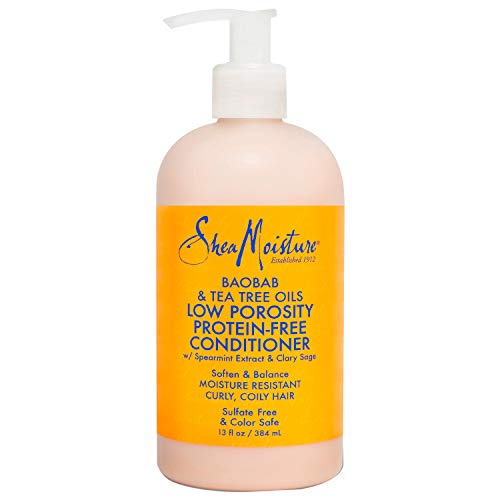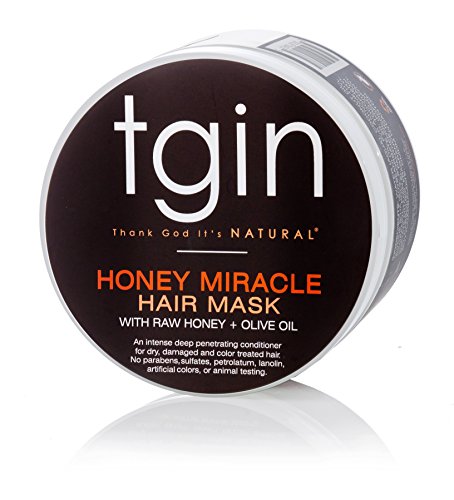Low porosity hair can be rough, dry, or brittle in texture, and it struggles to retain moisture. The solution? Deep conditioners.
Finding a great deep conditioner for low porosity hair is essential. Lucky for you, we’ve done the heavy lifting of working out just which deep conditioners are best for low porosity hair, so you don’t have to.

This post contains affiliate links and we may earn if you click on them (at no extra cost to you). Please read our full disclosure policy here.
In A Hurry? Our Top Picks
| Image | Title | Buy |
|---|---|---|
Top | Mielle Organics Babassu & Mint Deep Conditioner with Protein, 8 Ounces | Buy on Amazon |
 | Jessicurl, Deep Conditioning Treatment, Citrus Lavender, 8 Ounce | Buy on Amazon |
 | EDEN BodyWorks JoJoba Monoi Deep Conditioner | 16 oz | Moisturize, Soften & Repair Hair | Buy on Amazon |
 | Mielle Organics Mongongo Oil Protein-Free Hydrating Conditioner, 8 Ounces | Buy on Amazon |
What Is Low Porosity Hair?
Your hair’s porosity refers to its ability to retain moisture. Low porosity hair means – you guessed it – your hair struggles to absorb and hold onto moisture most.
This is because the cuticles of your hair are tightly packed, so any moisture has a harder time penetrating your hair shaft.
Low porosity hair also tends to be dense in texture, as the kinks and coils are tightly packed.
This also makes it more vulnerable to breakage and dryness.
Should You Deep Condition Low Porosity Hair?
Long story short – yes, you should absolutely use deep conditioner on low porosity hair.
Locking in moisture is essential in order to ensure your strands are as healthy as possible.
You need ingredients that won’t just coat your strands but will absorb into them, restoring hydration to parched locks and minimizing any breakage.
The best ingredients to look out for in deep conditioner for low porosity hair are:
- Shea butter
- Oils such as coconut, sweet almond, jojoba, and argan
That said, the best deep conditioners for low porosity hair should be lightweight.
Whether or not you opt for one with protein in is entirely contingent on your hair type.
Some products add protein to them. This can manifest in ingredients like:
- Keratin, collagen, or biotin
- Hydrolyzed wheat, quinoa, rice, or soy protein
- Hydrolyzed silk
The idea of using a protein-rich product is that the protein works to restore and repair any damaged or broken hair strands.
If you regularly color your hair or expose it to heat from styling or processing, protein can therefore be a godsend.
It will work to rejuvenate your hair’s natural bonds and reduce further breakage or shedding.
However, too much protein in hair can make it dry and brittle, and it will feel hard or rough to touch.
If your low porosity hair is protein sensitive, using a product with protein in it will only cause further dryness and frizz.
Knowing your hair’s protein level is therefore vital to ensure you choose the best deep conditioner for low porosity hair.
15 Best Deep Conditioners for Low Porosity Hair
Mielle Organics is a women-owned and crafts product with an organic focus that is specifically designed for customers with natural hair.
This deep conditioner is protein-free. It’s therefore one of the best for those of you with protein-sensitive low porosity hair.
It will leave your hair feeling hydrated, soft, and smooth. Ingredients like mongongo oil and almond oil to deliver long-lasting hydration.
The product is cruelty-free and has a Curl Pattern Protection technology to prevent tangling in even the curliest locks.
Why we like it: Protein free and highly hydrating
2. Jessicurl Deep Conditioning Treatment
Scented with citrus and lavender, this deep conditioner for low porosity hair goes on like a dream. Just comb it through your hair, leave it to sit for at least half an hour, and watch your newly-nourished locks thank you.
Shea butter and coconut butter combine with avocado oil, lavender oil, and pink grapefruit oil to create that delicious scent and hydrating formula. You can also choose an unscented option if you’d prefer, or if your scalp or skin is particularly sensitive to fragrance.
Why we like it: Smells delicious and is deeply moisturizing
3. Ouidad Curl Immersion Triple Threat Deep Conditioner
Coconut, avocado, and grapeseed oils all combine to create a deep conditioner for low porosity hair that will provide intense moisture and help to maintain natural curl formation.
Ouidad makes products exclusively for curly hair, so you know you’re in safe hands, and the formula is sulfate-free.
The grapeseed oil works to reseal the cuticle whilst the coconut and avocado oils intensely moisturize without weighing hair down.
Why we like it: Designed specifically for curly hair
This is another of the best deep conditioners available for those who have protein-sensitive low porosity hair.
The formula smells of tea tree, which is delicious, and oils like jojoba, sweet almond, tiare flower carrot seed and tea tree itself work to smooth and restore hydration. It’s also paraben and sulfate-free, and won’t weigh your hair down.
Why we like it: Budget-friendly but still hardworking
5. Pattern Intensive Conditioner for Tight Textures
Pattern Beauty is Tracee Ellis Ross’s brand – in case you didn’t know – and this is their most hydrating formula, so it’s the best deep conditioner for low porosity hair that they have.
The scent is delicate but not overwhelming – think neroli, rose, and patchouli, like a summer garden.
Avocado oil, safflower oil, shea butter, and acacia decurrens flower are natural botanical ingredients designed to protect kinky coils against dryness whilst still providing definition.
It’s also free of parabens, SLS, cyclic silicones, phthalate, and formaldehyde, and is cruelty-free.
Why we like it: Designed specifically for women with natural hair, and intensely hydrating to boot
Phew, okay, it’s a long name, but this deep conditioner for low porosity hair really works.
Be aware that it’s protein-rich, and will therefore fortify your hair’s bonds – but is best avoided if your locks are protein sensitive.
Manuka honey and yogurt extract combine with ingredients like shea butter to deeply moisturize heat-frazzled, dry hair, leaving it far more manageable and silky smooth.
Why we like it: A protein dense formula that intensely moisturizes
Sulfate and paraben-free, this deep conditioner has ingredients like safflower oil, castor oil, linseed oil, argan oil, and lavender oil to nourish your locks.
Added vitamin E also works to replenish and restore lost moisture to curly, coily hair, smoothing the cuticle without weighing it down.
The company is also socially-conscious, working to create jobs and empower the people who farm their oils.
Why we like it: A socially-conscious company who delivers a winning conditioner
For fans of coconut who also have low porosity hair, we doubt you’ll find a better deep conditioner.
Paraben and sulfate-free, this formula is specifically designed for 4C low porosity hair, combining humectants and oils that draw and lock moisture into strands.
Coconut and avocado oils combine with olive oil, shea butter, argan oil and mango seed butter to create a hydrating formula that will nourish your locks naturally.
Why we like it: Designed for 4C low porosity hair, this conditioner heals breakage and hydrates
This is another deep conditioner that contains protein, so bear that in mind when you’re considering your options.
Designed to replenish and restore moisture to frazzled hair, oils like babassu oil combine with added fatty acids and amino acids from wheat and soy to strengthen your strands naturally.
It also smells amazing, which is always a win.
Why we like it: Deliciously fragranced, this protein-enriched conditioner moisturizes well
The clue is in the name – this conditioner is designed for people with low porosity hair who want protein-free formulas.
Tea tree, spearmint, sage, and baobab oils all blend to make a daily conditioner that both smells great and provides a balanced blend of nourishment and hydration for parched locks.
It’s also formulated with minimal chemical nasties like sulfates, parabens, or petrolatum.
Why we like it: Designed for low porosity hair, this is one of the best deep conditioners for those who are protein sensitive
For the amount of product that you get, this product is very reasonably priced.
It’s also lightweight and won’t make your hair feel limp or heavy, but shea butter works hard with almond, coconut, and grapeseed oils to revive your hair and restore both manageability and softness.
Why we like it: Repairs and restores hair without being over-pricey
This product is a bestseller for a reason, and it’s easy to see why. Argan oil repairs, restores, and strengthens moisture-sapped strands, leaving hair silkier, stronger, and smoother.
Wash your hair as normal before smoothing this mask over your strands.
We love that it gets to work in five minutes, so it’s a fab product if you’re strapped for time, but you still need to add some moisture to your tresses.
Why we like it: A bestselling product that delivers on its promise of hydrated hair
Honey is a humectant – meaning it actively draws moisture into your strands – and is, therefore, a highly hydrating ingredient.
Combined with olive and jojoba oils, this mask will boost the levels of vitamins A, E, and D in your hair, nourishing thirsty strands and sealing in moisture.
Why we like it: A product from a woman-owned business that intensely nourishes
We’re fans of the brand Briogeo. They never use chemicals like sulfates, silicones, parabens, or phthalates, and their products really work.
Argan, avocado, and almond oil all combine to moisturize your strands, whilst proteins including biotin, hydrolyzed wheat, and hydrolyzed soy work to restore and strengthen damaged bonds.
Great for all hair types, the product is also vegan and cruelty-free.
Why we like it: Free from chemicals and intensely hydrating
Marked as an anti-frizz conditioner, this product is both vegan and silicone-free.
It will restore moisture balance to thirsty strands whilst sealing the cuticle of low porosity hair, thereby helping to improve softness and manageability.
Why we like it: Vegan-friendly, long-lasting, and moisturizing
How To Test Your Hair Porosity
One of the easiest ways to test your hair porosity is the strand test.
- Shampoo your hair (this removes any build up).
- Gently take a strand of hair from your head.
- Add this to a glass of water.
If your strand sinks quickly, you have high porosity hair. Alternatively, if it floats, your hair is low porosity.
How Often Should You Deep Condition Low Porosity Hair?
You should aim to condition your hair every time you wash it and incorporate a deep conditioner into your hair care routine roughly once a week.
If your hair is still super dry, you can up this to twice a week.
Low Porosity Hair Mistakes To Avoid
Protein
Remember, if your hair is protein-sensitive, you need to be avoiding deep conditioners with added protein. They’ll make low porosity hair even dryer and more brittle.
Using A Deep Conditioner With Chemicals
Chemicals like sulfates, parabens, phthalates, and other nasties have innumerate negative effects.
They may damage your hair or scalp – particularly if you have sensitive skin – and lead to dryness, frizz, and breakage.
Equally, they’ll likely build up more – which is a no for low porosity hair.
Using Heavy Oils
With low porosity hair, you want to be using thinner, lighter oils as these will penetrate into your hair strands and intensely moisture.
Heavier oils will form a slick on the surface of your hair but not work to hydrate strands from the inside out.
The best oils include coconut oil, avocado oil, and argan oil. Oils like jojoba, grapeseed, and castor oil are sealing oils, so they will lock moisture in.
Choosing a deep conditioner for low porosity hair with a combination of these oils is, therefore, best, as they’ll complement each other, working to hydrate strands and sealing in moisture.
Disclaimer: This site is not intended to provide professional or medical advice. All of the content on LovedByCurls.com is for informational purposes only. All advice should be followed at your own discretion. Ingredients may change at any time so always check the product label before using. Check our full disclaimer policy here.















